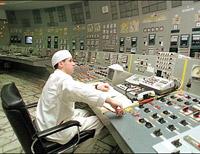The principal result of the last visit of Georgian President Mikhail Sahakashvili to France was the preliminary agreement for the possibility of constructing a nuclear power plant. Generally, the topic on the construction of a nuclear power plant is starting to become widespread in the post-Soviet region, and that is understandable. The CIS countries, and not only those countries that are under the energy dictate of Russia, wish to reduce their dependence on the energy from Moscow. In light of this, the construction of the nuclear power stations appears more possible for the future. The first to discuss this was Alexander Lukashenko, president of Belarus, who didn’t succeed in talks with Russia on cheap power sources. When it became clear that the arguments made by Minsk were not convincing for Moscow, which has raised the natural gas price, Lukashenko announced about the need to build a nuclear power plant in Belarus, which will make the country energy independent.
Azerbaijan also brought this up and, unlike Belarus, has sufficient sources of energy. The Azerbaijanis have calculated that the current resources will be sufficient until 2025.
“That is exactly when a nuclear power plant must be built in the country in order to not allow Azerbaijan to roll down into an “energy hole”,” announced a top-ranking Azerbaijani government official. In fact, it became clear that Azerbaijan even has a plan to build a nuclear power plant that was planned during the Soviet era, but which wasn’t implemented. According to the energy project of Azerbaijan, the plant must be constructed 100 kilometers away from Baku, in a non-seismic zone, and must completely satisfy the energy demands of the country.
In the meantime, Yerevan also spoke out about the benefits of having a second nuclear power plant, which activated MAGATE and the environmental protection agencies – this when the construction of yet another nuclear power plant in a small country that had not too long ago gone through an earthquake when there were talks on closing the first one…and then you have Georgia. It is not by chance that after it became clear that the talks in Paris referred to the nuclear power plant, Georgian PM Zurab Noghaideli made a public announcement according to which the issue was still far from a solution and that much depends on the position of Armenia.
“It is too early to talk about a nuclear power plant construction in Georgia. This depends more on Yerevan than us. It is too early to talk about whether the old reactor of Armenia will be changed or not, or if a new plant will be constructed in Georgia.”
In fact, it appears that the Georgian authorities will do their best to solve this problem to their benefit.
“The issue concerning the construction of a nuclear power plant in Georgia was discussed during the last meeting of Nikola Sarcosi and Mikhail Sahakashvili. The co-operation with the French “Areva” company (in fact, Armenia is also holding talks with that company-Y.S.) is very important for Georgia. It’s not about the creation or application of nuclear weapons, rather peaceful co-operation,” said speaker of the Georgian parliament, Nino Burjanadze. According to Georgian Ambassador to France Mamuka Kudava, it is expected that “Areva” representatives will soon visit Georgia to investigate the local conditions and then prepare corresponding technical guarantees with their Georgian colleagues.
“Consultations with Georgia’s neighboring countries are underway,” the ambassador announced to journalists.
Unlike the authorities, experts are careful.
“The construction of a nuclear power plant in Georgia is dangerous for the future,” says Gia Khukhashvili, expert on energy issues. According to Khukhashvili, the implementation of that project will lead to Georgia sitting on a nuclear bomb.
“The Government of Georgia must take into account the dangers that exist not only in strategic/political terms, but also seismological terms. The Armenian nuclear power plant already presents a danger to Georgia, and the authorities must realize that we don’t need new dangers,” Khukhashvili said to journalists.
However, it appears that nobody is really paying any attention to the expert’s standpoint. Some representatives of the Georgian forces speak out about the need for the nuclear power plant, which will be prospective for economic development. Well known Georgian Deputy David Bakradze announced that the plant will give Georgia the opportunity to become the biggest energy exporter in the region, and there is no need to talk about security because the plant is going to be constructed by one of the world’s most renowned companies in the field.
In any case, the situation is not that clear. The nuclear power plant construction not only depends on the desire of Georgia, where the power plant will be located, also the opinion of the neighboring countries, which may protest the program for any reason. Chernobyl and other tragic accidents taught many to be super cautious.

